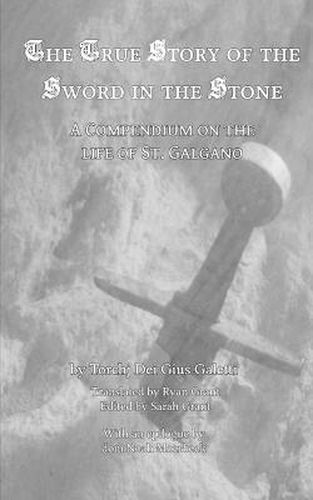Readings Newsletter
Become a Readings Member to make your shopping experience even easier.
Sign in or sign up for free!
You’re not far away from qualifying for FREE standard shipping within Australia
You’ve qualified for FREE standard shipping within Australia
The cart is loading…






This title is printed to order. This book may have been self-published. If so, we cannot guarantee the quality of the content. In the main most books will have gone through the editing process however some may not. We therefore suggest that you be aware of this before ordering this book. If in doubt check either the author or publisher’s details as we are unable to accept any returns unless they are faulty. Please contact us if you have any questions.
This is the first work of any length in the English language on St. Galgano, an Italian knight who gave up his comfortable life to become a hermit. One particular incident from his life is already known to English speaking audiences, though through entirely other means, namely, the medieval stories of King Arthur. It may come as a surprise that there was a real sword in the stone, which may still be seen in Galgano, Italy. The sword in the stone, though a significant miracle in St. Galgano’s life, is but a divine confirmation of his calling to penance, prayer and sacrifice for souls, whereas in Arthurian legend it is centered around the establishment of an earthly kingdom. This introduction into the Arthurian legend is late, around the 14th century, and most certainly has its origin in the story of St. Galgano. This simple, straightforward narrative was written in the 19th century, and has been translated for the first time into English, so as to acquaint English speakers with this famous Italian saint. The story traces St. Galgano’s life from his early youth and sinful years, his conversion at the hands of St. Michael the Archangel, and the circumstances by which he became a hermit on Mt. Siepi. Then, the events of his holy life, his death and burial, as well as a description of what the abbey of St. Galgano looked like. The author, Galetti, even adds the testimony of miracles associated with Galgano’s head, a relic preserved in Siena.
$9.00 standard shipping within Australia
FREE standard shipping within Australia for orders over $100.00
Express & International shipping calculated at checkout
This title is printed to order. This book may have been self-published. If so, we cannot guarantee the quality of the content. In the main most books will have gone through the editing process however some may not. We therefore suggest that you be aware of this before ordering this book. If in doubt check either the author or publisher’s details as we are unable to accept any returns unless they are faulty. Please contact us if you have any questions.
This is the first work of any length in the English language on St. Galgano, an Italian knight who gave up his comfortable life to become a hermit. One particular incident from his life is already known to English speaking audiences, though through entirely other means, namely, the medieval stories of King Arthur. It may come as a surprise that there was a real sword in the stone, which may still be seen in Galgano, Italy. The sword in the stone, though a significant miracle in St. Galgano’s life, is but a divine confirmation of his calling to penance, prayer and sacrifice for souls, whereas in Arthurian legend it is centered around the establishment of an earthly kingdom. This introduction into the Arthurian legend is late, around the 14th century, and most certainly has its origin in the story of St. Galgano. This simple, straightforward narrative was written in the 19th century, and has been translated for the first time into English, so as to acquaint English speakers with this famous Italian saint. The story traces St. Galgano’s life from his early youth and sinful years, his conversion at the hands of St. Michael the Archangel, and the circumstances by which he became a hermit on Mt. Siepi. Then, the events of his holy life, his death and burial, as well as a description of what the abbey of St. Galgano looked like. The author, Galetti, even adds the testimony of miracles associated with Galgano’s head, a relic preserved in Siena.